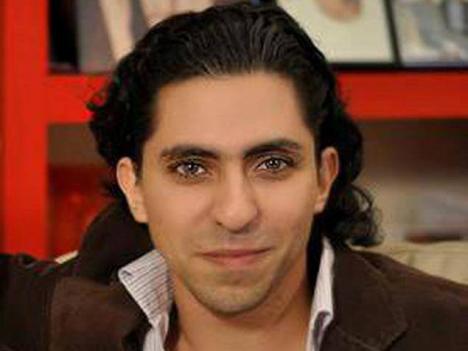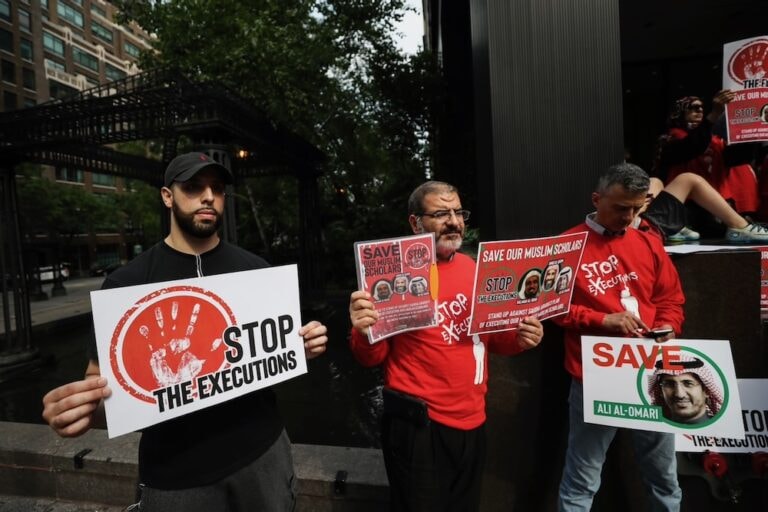Raef Badawi's wife, Ensar Haider, spoke to PEN International about her husband's case and her family's experience since his arrest.
Saudi Arabian blogger and editor of a liberal website, Raef Badawi, was arrested on 17 June 2012 in Jeddah.
Over a year later, in July 2013, Badawi was convicted under Saudi Arabia’s anti-cybercrime law and sentenced to 600 lashes and seven years and three months in prison.
He was found guilty of “insulting Islam”, “founding a liberal website” and “adopting liberal thought”. He was also convicted of “insulting religious symbols” and criticising the religious police and officials calling for gender segregation in the Shura Council. The online forum, Liberal Saudi Network – created to foster political and social debate in Saudi Arabia – was ordered closed by the judge.
In December the Saudi Court of Appeal overturned Badawi’s conviction and sentence, and ordered a review of the case. On 25 December 2013, a judge recommended that Badawi should be referred to the General Court on charges of “apostasy”. If convicted, Badawi could face the death penalty.
PEN International spoke with Badawi’s wife, Ensaf Haider, regarding her husband’s case and her family’s experience since his arrest.
Why did Raef decide to set up Free Saudi Liberals?
For Raef, liberalism is an intellectual project, which aspired to achieve an official status and to represent Saudi liberals on the ground and to fight injustice wherever it exists. This was the idea in 2008 when Raef first set up the Free Saudi Liberals website as a platform for this project to take shape.
Can you talk about the aims and objectives of the ‘day of liberalism’ conference that Raef was organising? Why was it important to him?
The idea for the ‘day of liberalism’ conference came from the belief, held by Raef and by Saudi liberals specifically, as well as others in the Gulf more generally, that there is a need for our voice to be heard in the international and local communities. It also accused the opponents of liberals of distorting the image of liberalism by claiming that this thought leads to degeneration, vice and so on.
The 7th of May, which was chosen as ‘the day of liberalism’, was the bomb that began the war against Raef as an individual, launched by the authorities and the official religious establishment.
What happened when he was arrested? How did you find out?
I was not with Raef in Saudi at the time; I left for Lebanon after the threats against Raef had increased. I went to Lebanon with my children, for the sake of our safety and until Raef could somehow solve the problem of his travel ban. He was put on a travel ban at the end of 2008, after he had returned to Saudi from the UK.
The news of his arrest was very shocking for me, and there were many questions in my mind, especially as I was not with him at the time.
Had he received any threats or warning for any of his activity online prior to setting up the website?
Raef received a number of threats from extremists in 2008, and the threats increased after the issuing of a fatwa that considered Raef an infidel and an Apostate by the extremist cleric, Abdul Rahman al-Barrak.
How did you find out that Raef may face apostasy charges in court? What were your reactions? What are the legal next steps? Are you in contact with his lawyer?
I am in regular contact with his lawyer, and that is how I found out. We are currently waiting for the Court of Appeal to make a decision on his case. I consider Raef’s trial as an inquisition, just like the ones that took place during the European Dark Ages. To kill a person just for their opinion, that is the real crime.
Has Raef been able to have any family visits since his arrest?
Raef’s family has not been allowed to visit him; in fact his sister was prevented from visiting him on a number of occasions.
How is his health condition? Do you know if he has faced any torture or ill-treatment?
Raef’s health has deteriorated; he developed diabetes when he was first arrested, and he has faced problems with his heart. He also suffers from unsanitary detention conditions and from malnutrition, but I have not heard anything about him being subjected to torture or anything of the sort.
Despite all of this, his moral is very high and he is not broken.
How has your life changed since Raef’s arrest?
My life has changed 180 degrees, it is enough to say that overnight I became both mother and father to my children, and I live in a daily nightmare of questions from my children about Raef.
The biggest change in my life has been Raef’s absence.
Have you received threats from the Saudi Arabian authorities before/after leaving?
Yes of course, I have been threatened in different ways. I received a court verdict that would force me and Raef to separate, on the basis of him being an Apostate. I also received threats from the Saudi embassy in Lebanon that they would kidnap my children and forcibly return them to Saudi Arabia. This was just before I arrived to Canada, where I now reside permanently.
Did you, or Raef ever imagine the magnitude of the government’s reaction to his website?
I did not expect the reaction of the Saudi authorities to the website, or that it would cause this crisis for Raef. But of course, the route to freedom requires sacrifices.
Do you believe the legal consequences faced by Raif and other prisoners of conscious in the country will work to deter or frighten others from engaging in similar activism?
No not at all, I believe that there is a will for freedom in the country that will not be deterred. When Raef heard the judge tell him ‘we will kill you’, Raef responded with a wide smile and the victory sign.
What do you hope for the future of freedom of expression in Saudi Arabia? Do you know of any other detained writers/bloggers/editors there?
I wish that one day there will be real freedom, a constitution, a parliament, and absolute freedom. There are too many prisoners of conscience, for example there is Dr. Mohamad al-Qahtani and many others.
If you could send a message to Raef, what would it be?
I want to tell him “I am so proud of you, and the height of my pride for you I am frightened for you. I beg you to return to me, just as you promised you would, and I don’t want anything more than that”
As you know – PEN members around the world have been campaigning for Raef’s release – including here in Canada. What do you think would be the most effective steps they could take to pressure the Saudi authorities to release Raef? Do you have a message for them?
My message to the solidarity movements that have stood with Raef and informed others of his situation; I used to believe it was a fantasy for a person to stand in support of another person regardless of geographical, racial, religious, linguistic and other differences, but what you have done for Raef’s case has taught me that I knew nothing about humanity. You are the noble ones and I owe you a great thanks.
My life has changed 180 degrees and I live in a daily nightmare of questions from my children about Raef. The biggest change in my life has been Raef’s absence.



